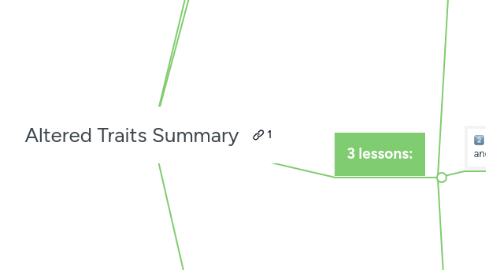
1. 1-Sentence-Summary:
1.1. Altered Traits explores the science behind meditation techniques and the way they benefit and alter our mind and body.
2. Favorite quote from the author:
2.1. "A wealth of information means a poverty of attention." - Daniel Goleman
3. 3 lessons:
3.1. Meditation helps to improve concentration and mental performance while multitasking exhausts your brain.
3.1.1. Contrary to popular belief, the brain is incapable of multitasking.
3.1.1.1. Instead, when we attempt to multitask, our brain has to work much harder by switching between multiple tasks quickly.
3.1.1.2. This shifting means we lose concentration and have to take more time to refocus on the original task.
3.1.2. People that often multitask more easily fall prey to distraction, and they have to use more of their brain to concentrate.
3.1.3. The effects of meditation are even better for those who tend to multitask frequently.
3.1.4. As for long-term effects of meditation, a 2013 study found students who learned and practiced meditation for two weeks before a graduate school entrance exam improved their scores by up to 30 percent.
3.1.4.1. They also experienced reduced distraction after meditating.
3.1.5. Next time you are tempted to multitask to get more done, try meditation instead, you’ll probably get more done, and your brain won’t feel so exhausted.
3.2. “Default mode” isn’t good for your brain, and meditation will help you turn it off.
3.2.1. When we’re lying on the couch after a long day at work to rest, we’d like to think we’re giving our mind a break.
3.2.1.1. But in reality, we’re not.
3.2.2. When we’re doing nothing, parts of our brain are highly active.
3.2.3. Though your brain is only a small percentage of your body in mass, it takes up 20 percent of your energy to run.
3.2.4. Whether we’re solving a calculus problem or sitting in a hammock outside, we’re using the same proportion of energy.
3.2.5. This is because even if you’re not doing anything, your brain stays active in what is known as “default mode.”
3.2.6. When we’re in default mode, our mind wanders, which is correlated with unhappiness.
3.2.6.1. Our unoccupied brain tends to look back on past mistakes and anxieties and dwell on them.
3.2.7. It’s not good for your brain to always go to default, and this is where meditation will help you.
3.2.7.1. A study found those that the areas of the brain that run full-time in default mode were “relatively deactivated” in people who were experienced meditators.
3.2.8. We are just starting to discover that regular meditation can even change the pathways in the brain.
3.3. More meditation means more benefits for you.
3.3.1. Meditation can be different for everyone, as there are many different kinds and varying lengths. Even a small amount will be beneficial.
3.3.2. Among all of the positive effects found in the studies on meditation, none of them have long-lasting benefits without continued practice. So consistency is key.
3.3.3. But evidence shows more you practice, the more you’ll get out of it because meditation changes the way the brain works.
3.3.3.1. After practicing for thousands of hours, your body will be less responsive to stress triggers and release the stress hormone, cortisol, less.
3.3.3.2. The more we meditate, the better concentration becomes and the less our mind wanders, which makes us unhappy.
3.3.3.3. Doing compassion meditation regularly will improve empathy the more you do it, and will make you more likely to help others in need.
3.3.4. Meditation can and will improve your life. Take the time to slow down and try it out.
